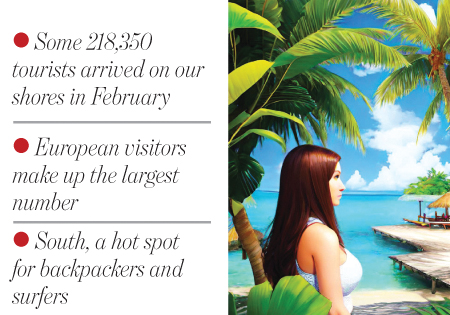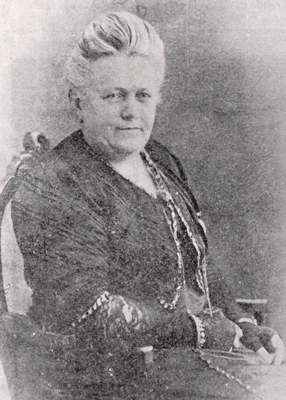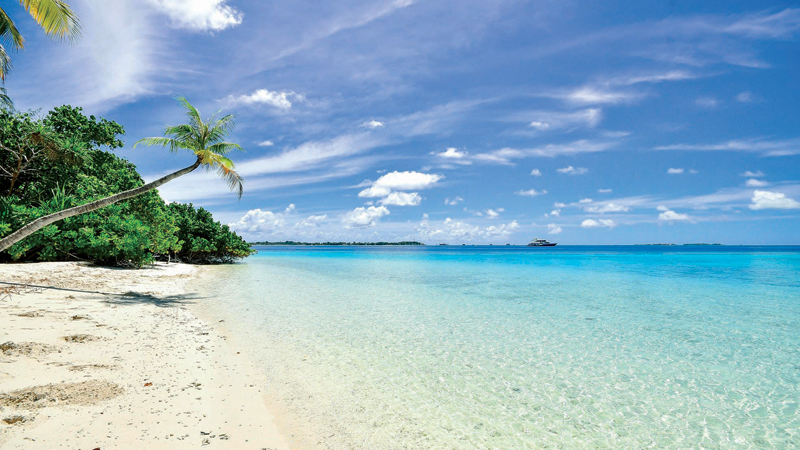 February this year saw 218,350 tourists arriving on our shores, a change of 102.09 percent compared to the same month last year, according to the Sri Lanka Tourism Development Authority’s monthly report. European tourists are the largest arrivals by region with a percentage share of 61.5 percent, nearly double compared to the Asia Pacific region at 32.1 percent; the second largest tourist share.
February this year saw 218,350 tourists arriving on our shores, a change of 102.09 percent compared to the same month last year, according to the Sri Lanka Tourism Development Authority’s monthly report. European tourists are the largest arrivals by region with a percentage share of 61.5 percent, nearly double compared to the Asia Pacific region at 32.1 percent; the second largest tourist share.
The South in particular is teeming with tourists and is a hotspot for backpackers and surfers. Hip bars, fancy cafes and hostels have virtually popped up overnight in Southern hamlets like Kabalana, Midigama and Weligama to meet the increasing tourist demand; transforming these once quaint fishing towns into exciting locales full of revelry and adventure.
 A typical tourism boom leads to an increased number of people in a small area; contributing to the arrival of ‘others’ to a local community which attracts criminal elements. The potential of earning a quick buck by duping a traveller is highly attractive to hucksters and anti-social deviants. Solo female travellers from the West are especially helpless in this scenario.
A typical tourism boom leads to an increased number of people in a small area; contributing to the arrival of ‘others’ to a local community which attracts criminal elements. The potential of earning a quick buck by duping a traveller is highly attractive to hucksters and anti-social deviants. Solo female travellers from the West are especially helpless in this scenario.
I spoke to two female expatriates, who wished to remain anonymous, on why they came to Sri Lanka and chose to make this island their home. The women arrived as travellers and quickly fell in love with the serenity and hospitality that Sri Lanka offered. They had insightful opinions on how the dynamics of gender, race and privilege play out in this island. I also consulted studies on post-colonial theory to better my understanding.
Eve is from the Czech Republic. She came to Sri Lanka ten years ago, attracted by the island’s mystique of jungles and elephants. Eve said she had experienced both physical and sexual violence. In an earlier conversation Eve, told me how she was duped by a beach boy some years back; the promise of adventurous romance had ended in disaster.
She also said she had been threatened for helping girls who have experienced similar trauma. “I have also seen the sexual harassment of a small boy but was too powerless to help”.
Heartbreak
I asked her why she chose to remain in Sri Lanka. “It’s a little hard to explain. I just didn’t want to give up. I created my own independent life here which is pretty hard for a white woman and I didn’t want to lose all that because of heartbreak. I ask myself everyday why I chose to live here. It’s because of the connection to nature, the ocean and food”. Eve said she didn’t miss the hustle and bustle of her former life and the isolation had given her freedom to reflect and be herself. “Maybe I feel more alive because I have to fight to survive”.
A month ago, a flyer advertising a white-only party in Unawatuna received enormous backlash online and sparked debate on white privilege enjoyed by western travellers who often get preferential treatment in tourist hotspots.

Marie Musaeus Higgins
Founder of Museus College
Eve disagreed and said that white privilege is nothing close to gender discrimination. “We live in a patriarchy so there is minimum respect. They see a white woman as a ‘spoilt brat’ and will only help to take advantage of her later. We are free, understanding and good listeners. We are more open-minded and that’s a blessing and a curse. People here, especially men, love that and use it to their advantage”.
She said that she doesn’t consider herself privileged at all because she has to pay ten times more money for goods and services than the locals. She also had strong opinions on why locals, particularly the ones from Colombo, are not welcome in the South. According to Eve, it’s not a matter of privilege but the attitude of certain locals which has prompted Southern businesses to limit or outright shun Sri Lankans.
Susan quit her corporate job in Canada seven years ago for a life of travel. She discovered Sri Lanka while travelling South East Asia and decided to stay. At first she lived in Colombo to do business consulting and later moved down south where she rented a property to start a hostel. I asked Susan what problems she faced as a foreign woman. “As a white woman you’re either a porn star or an ATM. Walking down the street you get constantly harassed for money or catcalled,” she says.
King
“The foreign man is treated as a king here. The Sri Lanka man also considers himself king here because it’s a patriarchal society”. The Suddos, she says, have it a lot easier here than white women, because they don’t get sexually harassed. “Some acknowledge this privilege while some don’t.”
On being viewed as ATMs, Susan says some locals have the notion that foreigners are all gullible. “My first landlord literally thought I was stupid. He told me he knows sales and marketing but couldn’t run a guesthouse on his own. They think foreign women are rich and stupid,” she said while adding that the harassment she faces is mostly verbal and rarely physical.
When faced with a situation, Susan resorts to the little Sinhalese she knows which usually works. She says she isn’t harassed by the beach boys, but it’s the ordinary people who catcall and try to grab you.
“Some would ask ‘If you don’t like it so much then why do you live there?’ It’s because, it’s a beautiful country”. Susan says she sees a lot of potential in a city like Colombo as society has transformed so much in the last seven years.
“The nosy nandas are dying out and it will be a more liberated generation”.
As resident aliens, there were some foreign women who made a huge impact on Sri Lankan society. Anne Ranasinghe and Marie Musaeus Higgins, both women from German Jewish extraction, are two great examples. Susan and I even joked that a Suddi ruled Sri Lanka for a time; referencing the rein of Queen Victoria over the British Empire – which Ceylon was a part of.
Although Eve and Susan’s story is different to that of Anne and Musaeus, they are part of a new pattern of immigration from the developed world. Susan told me she doesn’t want to call herself an ‘expatriate’. “Call me an immigrant,” she insisted while claiming that the word expatriate whitewashes (no pun intended) white immigrants.
Privilege
The irony is not lost here. The promise of living in a forever-summer tropical paradise offers perks for those who come from the affluent west; where know-how, exposure and privilege has an advantage on a local any day. We don’t have to look far to see this play out in a microcosm, as residents of the more cosmopolitan Colombo have a slight social advantage than those who come from elsewhere in the country.
The women argued that gender-discrimination affected them more than their colour privilege, but this posed more questions than answers. Like a lot of Asian societies, Sri Lanka also has its form of colour discrimination where lighter skin is prized more than darker skin as the skin-lightening industry could testify.
According to a report by the World Health Organisation, “The skin-lightening industry is one of the fastest growing beauty industries worldwide and is estimated to be worth USD 31.2 billion by 2024.”
The report stated that the popularity of this industry is mainly in South Asian countries like India, Bangladesh and Sri Lanka. So the simplistic explanation that white women are made into objects of desire because of their liberal nature is questionable. Maybe culturally manufactured notions on beauty and appeal could be the result of the unrequited attraction and harassment, while others would still argue that a white woman presents a promiscuous liaison whereas a local woman is expected to be chaste. But then again, which woman is ‘easy’ and ‘chaste’ still indicates patriarchal male chauvinism.
Eve and Susan’s accounts highlight the intersectionality between race and gender. While they may experience certain privileges as white women, they also face discrimination and exploitation, particularly in a patriarchal society. This reflects how hierarchies continue to shape social structures and attitudes towards gender and race.
The names in this article have been changed to protect privacy




